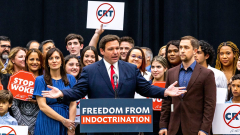- Florida Gov. Ron DeSantis recently appointed six new trustees to a public liberal arts college accused of promoting “woke” politics.
- DeSantis and others have also targeted professor tenure as a means of cracking down on critical race theory.
- Conservative organizations continue to funnel money into academia in an effort to influence course offerings and scholarship.
Florida Gov. Ron DeSantis’s decision to overhaul the board of trustees at a progressive public college was his latest move in a larger movement against so-called “woke” education.
“Like so many colleges and universities in America, New College of Florida has been completely captured by a political ideology that puts trendy, truth-relative concepts above learning,” Bryan Griffin, DeSantis’s press secretary, told USA TODAY, attributing low student enrollment and other financial challenges to the college’s “skewed focus and impractical course offerings.”
The shake-up is part of a years-long effort by DeSantis and a growing contingent of conservative leaders to chip away at what they view as higher education’s liberal bias. They’re shepherding legislation targeting diversity, equity and inclusion initiatives and critical race theory, including bills explicitly addressing colleges through provisions that would reduce tenure. They’re shaping higher education in more subtle ways, too, including through philanthropic giving.
Observers say these trends will continue into 2023 as legislative sessions kick off and key players ramp up their campaigns for national elections.
Conservative board takeover: DeSantis seeks to transform Sarasota’s New College
‘We will not go down without a fight’: New College students respond to DeSantis
What happened at New College of Florida?
New College has a reputation as a left-leaning college. All but two of the new appointees to New College’s board of trustees are prominent conservatives.
DeSantis’s chief of staff has said the hope is to make New College into something “more along the lines of a Hillsdale of the South.”
Hillsdale is a private Christian college in Michigan that has been lauded by some on the right for championing conservative values. The college doesn’t receive any federal funding, exempting it from some of the civil-rights mandates typically applied to higher education institutions.
More: Can Florida Gov. Ron DeSantis recreate Michigan’s Hillsdale College in his state?
The prospective New College trustees “are committed to refocusing the institution on academics and truth and ensuring that students are receiving a quality education,” said Griffin. “The campus will become a place for learning and discourse, as it was designed to be.”
New College students have said they’re drawn to the school precisely because of its offerings and because its values contribute to its academic rigor, as reported by the Sarasota Herald-Tribune, part of the USA TODAY Network. Among those values: building a “just, diverse, equitable and inclusive community” on campus.
In a statement, New College President Patricia Okker said she sees “tremendous opportunity for New College and I believe that our new trustees will bring fresh ideas and new perspectives. New College has a long history of embracing change, all while being true to our mission of academic excellence.”
Opinion: Two former New College trustees respond
Is there a liberal bias in higher education?
College students tend to skew more liberal than the general population. In a 2020 survey of 20,000 students across 55 colleges, the most comprehensive analysis of its kind, 50% of respondents identified as liberal, versus 26% as conservative. Roughly a quarter of Americans generally say they’re liberal.
However, just 19% of Gen-Z adults – the group of people most likely to attend four-year colleges now – identify with the right, suggesting there are more conservatives on college campuses than among their age group as a whole.
“Most colleges and universities are not extreme,” said Samuel Abrams, a visiting scholar at the right-leaning American Enterprise Institute (AEI) and politics professor at Sarah Lawrence, a liberal arts college in New York that is often ranked as one of the country’s most liberal colleges. With the exception of some liberal-arts schools, particularly in the Northeast, “students are pretty centrist.”
Abrams’ research suggests administrators and other leaders – from department heads to dorm staff – are the ones driving colleges’ leftward shift. “We have undergrads who are a little bit more liberal than the average American, we have faculty who are understandably liberal but not crazy, as well as some conservatives,” Abrams said. “And then you have administrators who are extremely liberal activist progressives.”
Students continue to prize free speech rights on campus but increasingly feel those rights are being trampled upon, according to 2022 polling data from the Knight Foundation and Ipsos. The percentage of students who say speech rights are secure has dropped every year since the survey first asked the question in 2016.
Just last week, news broke that Harvard – where roughly eight in 10 faculty identify as liberal – had rescinded a fellowship offer to Kenneth Roth, the former executive director of Human Rights Watch. Roth is a prominent critic of Israel, which his organization has regularly accused of war crimes against Palestinians.
Critics are blaming the decision on pro-Israel bias within Harvard leadership and describing it as yet another example of the ways in which colleges – particularly elite ones – police thought.
Christian colleges: Battle over wokeness isn’t just about politics, it’s about dollars
Board shake-up part of larger movement against CRT, DEI
Since 2021, lawmakers in dozens of states have introduced legislation restricting lessons on race and systemic discrimination – often described as critical race theory – as well as on sexuality and gender identity.
For the most part, the bills have centered on K-12 schools. Increasingly, though, the legislation has focused on higher education. Thirty-nine percent of bills in 2022 targeted higher ed, compared with 30% in 2021, according to an analysis last year by PEN America, a free speech and literacy organization.
Another trend: Legislation targeting Diversity, Equity and Inclusion initiatives – for example, DeSantis’s “Stop W.O.K.E. Act,” whose higher education provisions are on hold for now because of a lawsuit. DeSantis is appealing.
More: DeSantis dealt ‘Stop Woke’ setback after promoting policy on Election Night
Christopher Rufo, a senior fellow at the Manhattan Institute and one of the four prominent conservatives appointed by DeSantis to the New College board of trustees, has been at the forefront of the anti-CRT, anti-DEI movement. He and one of the other new appointees – Matthew Spalding, a dean and professor at Hillsdale – also played key roles in the Stop W.O.K.E. act’s creation.
Rufo, through his chief of staff, said he would only consent to an interview if the reporter removed her pronouns from her email signature for 90 days. USA TODAY rejected the request and reiterated its desire for an interview but did not hear back. People state pronouns in email signatures for a variety of reasons, including to avoid being misgendered by people with whom they communicate.
“I was honored to be appointed to this board, along with friends and colleagues from the conservative movement,” Rufo wrote in a blog post Thursday. “Governor DeSantis has tasked us with something that has never been done: institutional recapture. If we are successful, the effort can serve as a model for other states.”
Culture wars: House Republicans attack Defense Department for ‘woke’ social policies
Is New College replacing ‘one set of extremism with another’?
Mark Bauerlein, a fellow conservative and recent appointee to New College’s board, distanced himself from Rufo, however, saying he’ll take a different approach.
“I don’t have goals in mind,” the Emory University English professor emeritus sa





